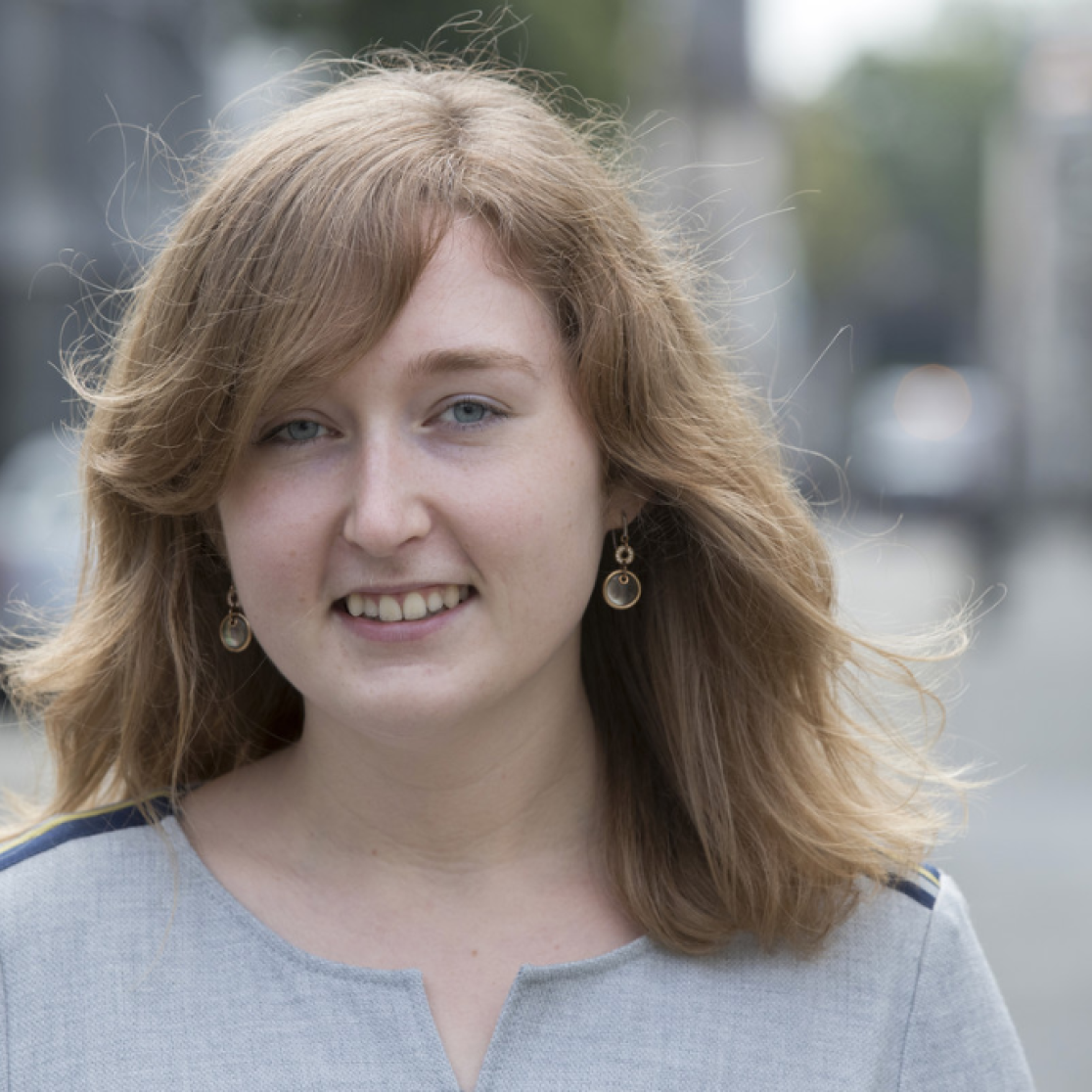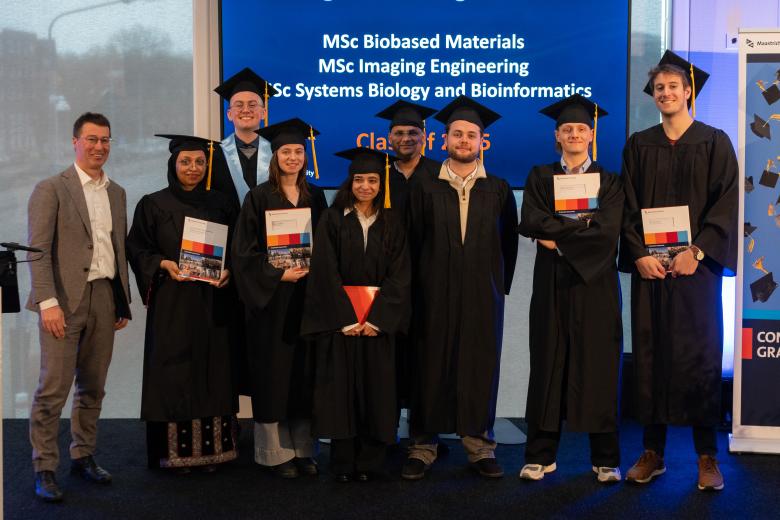CAPHRI Societal Impact Team Award for research on COVID-19 in nursing homes
On 23 November, the team within research institute CAPHRI that investigates COVID-19 in nursing homes received the CAPHRI Societal Impact Team Award for the great national and international impact their research has had on the well-being of nursing home residents. Thanks to the recommendations from their study, Dutch nursing homes reopened at the end of May 2020 after being closed to visitors for almost two months. If all goes well, their doors won’t close again – even in the next wave. Dr. Ramona Backhaus, senior researcher at CAPHRI, considered it a privilege to participate in this study.
Health scientist Ramona Backhaus came into contact with nursing homes during her master's programme. At that time, she was working part-time developing an electronic game for people with dementia: ‘I immediately found it an interesting field. Shortly afterwards, I was able to start a PhD position at CAPHRI in the field of work-related issues in nursing homes; specifically researching what competencies staff should have and what can be done to improve their working conditions. Even after my PhD, I continued to do research within the Living Lab in Ageing and Long-Term Care Limburg. Then came the corona crisis. Worldwide, the most vulnerable people were immediately put into lockdown. The Netherlands was the first country to carry out scientific research into the possibility of admitting visitors again in a safe manner; the first country to systematically look into that possibility.’

The research team of COVID-19 in Nursing Homes consists of Dr. Ramona Backhaus, Audrey Beaulen MSc., Dr. Bram de Boer, Prof. dr. Jan Hamers, Johanna Rutten MSc, Erica de Vries MSc., Dr. Judith Urlings and Prof. dr. Hilde Verbeek.
Pilot
At the start of the corona crisis, Jan Hamers, Professor of Care of Older People, was approached by the Ministry of Health, Welfare and Sport with a request from the Academic Collaborative Centres for Care of Older People to help think about corona policy within nursing homes. Initially, this concerned registrations. The tasks were divided among various centres, and the Living Lab in Limburg, together with the University Knowledge Network for Care of Older People in Nijmegen, set to work on research into the ban on visitors. Backhaus: ‘Partly at our request, a small-scale pilot project was launched: 26 nursing homes were allowed to admit one visitor per week for one hour, under strict conditions. We monitored what happened during the pilot and fortunately, despite the relaxed visiting regulation, the number of infections did not increase. The well-being of the residents did improve considerably. Based on these results, the Ministry decided at the end of May 2020, under strict conditions, to lift the visiting ban. After the reopening, our team conducted in-depth interviews in five nursing homes which were incredibly emotional. They interviewed residents who had missed their families terribly and often did not understand at all why they weren’t able to visit for so long. Relatives who had endured horrible months and were afraid they wouldn’t see their partner or parent alive again. Of course, we also talked to the staff members who found the situation very worrying. What if they themselves were exposed to infection and their own families at home were at risk? Don't forget that the employees were still working under great strain. Adhering to the new measures on top of regular care was extremely stressful. At the same time, they were very happy for the residents who were overjoyed to be visited.’
"It is difficult that the attendant in the home is allowed to be with my mother without a face mask, and she also does her shopping at the supermarket. Her risk of contracting the virus is just as great as mine."
Daughter of a resident during the period when there was a shortage of face masks in nursing homes
Differences
One of the strict measures during the reopening of the nursing homes was that visitors and residents were not allowed to have any physical contact. That was difficult for both parties. Backhaus: ‘To people who are psychologically healthy, it could be explained. But people with dementia didn't understand it at all. Why no hug? Why so far away? Why a mask? Who are these people? This also made it difficult for the staff who were supposed to enforce the measures. We saw that the homes dealt with the rules in different ways. In some, the visitor sat with the resident for an hour in the restaurant of the nursing home in the company of a staff member. In this way, it was possible to check that they were not touching each other. In other homes, the visitor was allowed to go alone with the resident to their room without anyone checking on them.’ You might ask why you would deny this vulnerable group, who may not have very long to live, the right to see their families. ‘That is a difficult discussion’, says Backhaus, ‘in a nursing home, you form a group with others. You have to weigh the individual interests against those of the group. You can't just decide for everyone that the rules are lifted and everyone has to take the risk. There are also people living in a nursing home who don't want to be put at risk.’
"It was an emotional outpouring after not seeing each other for eight weeks, it was like we were dating again."
Wife of resident
And now?
For the time being, we are not rid of COVID-19 it seems. What does that mean for this research? ‘Our project is still ongoing and we remain accessible to the Ministry of Health, Welfare and Sport, and we can always advise them – requested or not. Our team is enormously proud of what we have achieved for nursing home residents with our research, both nationally and internationally. Our research was published in the American JAMDA and it became clear that nursing homes could remain open all over the world. If the homes will stay open for visitors during a new wave? This is impossible to say. We hope so. What effected me most was that after the ban was lifted, visitors were shocked by the condition of their relatives in the nursing home. Sometimes their health, physical and/or mental, had deteriorated due to isolation; and they realised that they had missed two months of valuable time together. Therefore, let us hope there will be no more visiting bans.’
"I actually felt very bad for the residents that they were not allowed to have visitors. It was also awful for the family, because, well, they live in a nursing home and you don't know how long someone will live. So, I think it's good that visitors are allowed again."
Nursing home employee
CAPHRI Societal Relevance Team Award
The CAPHRI Societal Relevance Team Award is presented annually during the CAPHRI Research Day. Eligible for the award are CAPHRI teams whose scientific work in the past year has made a change outside the academic community. The award is intended for teams, not individuals, to highlight the importance of team science and collaboration with interdisciplinary teams. Each of the six research lines within CAPHRI nominates a team. This year the award was presented by jury member Dr Cristian Ghergu, Project Leader Maastricht Platform for Community Engaged Research (MPCER).
Text: Margot Krijnen
Photo: Marcel van Hoorn
Science is an indispensable building block for a better future for us and future generations. The University Fund Limburg/SWOL supports Maastricht University in its efforts to stimulate and promote scientific research and education. Would you also like to support scientific research with an impact on society? Then make a donation to the University Fund Limburg/SWOL.
Also read
-
Flour, family, and forward thinking: the evolution of Hinkel Bäckerei
In the heart of Düsseldorf, the comforting aroma of freshly baked bread has drifted through the streets for more than 130 years. Since its founding in 1891, Hinkel Bäckerei has evolved from a small neighborhood bakery into a cherished local institution.
-
Green school playgrounds boost concentration and wellbeing
Children at schools with green playgrounds are better able to concentrate and display more social behaviour. This is the conclusion of a follow-up study within the long-running project The Healthy Primary School of the Future .
-
Ron Heeren appointed fellow of the Netherlands Academy of Engineering
Professor Ron Heeren, distinguished university professor at Maastricht University (UM) and director of the Maastricht MultiModal Molecular Imaging Institute (M4i), was appointed as a fellow of the Netherlands Academy of Engineering (NAE) on Thursday 11 December.